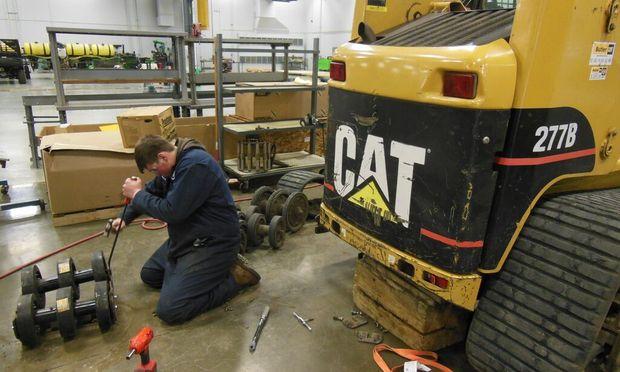What’s the secret to a nation full of successful community colleges? South Dakota may have the answer.
A student at Lake Area Technical Institute.
Community college is often perceived as the underdog in American higher education. Many are plagued by treacherous drop-out rates, poor teaching standards and dismal job prospects. But there is one community college — Lake Area Technical Institute in Watertown, South Dakota — that is getting a lot of attention for its student successes.
In fact, in May of this year President Obama visited Lake Area Tech to give the commencement address at this little South Dakota community college that could.
Lake Area Technical Institute President Michael Cartney says all the Obama excitement, while nice, isn’t what makes his school a success.
“Our faculty really know and care about their students. Things like the Aspen Award three consecutive times, the president coming to give our commencement address, are kind of an outflow of what our faculty really does just a great job at — getting in touch with the students and teaching them what they need to learn,” Cartney says.
Watertown, South Dakota, where Lake Area Tech is located, has a 2.6 percent unemployment rate — that’s compared to a 5.5 percent national unemployment rate. According to Cartney, a lot of his students have full time employment lined up in December, five months before they graduate in May.
“[Obama] talked about how a graduate from Lake Area Tech will earn 49 percent more than the other new starts in the area just six months after graduation. Ninety-eight percent of them will be either continuing their education or employed,” Cartney says, “One of the things I point out with regularity is Lake Area Tech wouldn't be Lake Area Tech if it wasn't in Watertown, South Dakota. The community here gives our students such an embrace. For our students to know that everybody here is pulling for them to succeed is a big reason that we have such a high graduation rate.”
Fifty percent of Lake Area Tech students are Pell Grant recipients, meaning the school has a significant number of low income students. And South Dakota is planning to ramp up its commitment to giving free education to qualifying students who go to one of four technical institutes and then enroll in a high demand occupation.
“They will be getting a career, not just a scholarship, because at the end of their schooling, they’re going to be employed in South Dakota for at least three years,” Cartney says, “And our students make outstanding salaries and income once they graduate.”
So what is the secret to Lake Area Tech’s success — its high graduation rates, and successful alumni careers? Cartney says it all comes down to his school’s personal touch.
“We insist that our faculty know more than just their [students’] names, that they know their story. Everybody that comes here has a story and a background and that impacts their education,” Cartney says. “We believe that if a student makes a connection with someone and knows that that person cares about how they're doing in school — whether it's the parking lot attendant, their instructor or somebody in the community — that has more impact on their success than what their incoming GPA is, what their ACT score was. That personal connection and somebody believing in you really turns a corner for a lot of our students and gives them the motivation to complete what is a very hard and rigorous program. One of the things we tell students as they're coming in is ‘Be with people that care about you and care about the people that you're with. And that way both of you will get through.’”
This story first aired on PRI's The Takeaway, a public radio program that invites you to be part of the American conversation. It's part of a year-long series on community colleges around the country.
The story you just read is accessible and free to all because thousands of listeners and readers contribute to our nonprofit newsroom. We go deep to bring you the human-centered international reporting that you know you can trust. To do this work and to do it well, we rely on the support of our listeners. If you appreciated our coverage this year, if there was a story that made you pause or a song that moved you, would you consider making a gift to sustain our work through 2024 and beyond?
